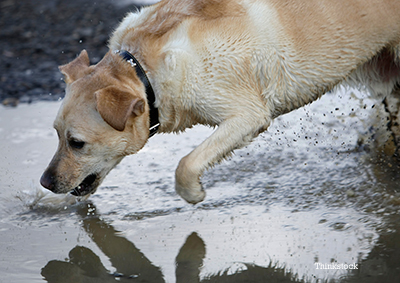
What is leptospirosis?
Leptospirosis is an infectious disease that can affect many animals including wildlife, rodents, dogs and people. The disease is caused not just by one specific strain of Leptospira spp. but rather by any of a number of different serovars (types) within this bacterial genus. They exist everywhere in the world but are most commonly prevalent during periods of heavy rainfall1.
How does leptospirosis spread?
Your dog can contract the organism through direct contact with another infected animal, by eating infected meat or most commonly through contact with anything that has been contaminated by the urine of an infected animal. Most infections occur when dogs go swimming in and/or drink infected water, but in reality most anything (plants, dirt, objects or water) can be a potential source of infection2.
Additionally, it is important to note that once they are infected, wild animals can serve as reservoirs and may continue to excrete the bacteria into the environment for months or even years, which may then live in the environment for weeks to months1.
According to the CDC, people can contract leptospirosis in the same ways your dog can, through contact with urine or other body fluids (except saliva) from an infected animal or by contact with other contaminated sources. Person to person transmission is apparently rare.
What are the symptoms of leptospirosis infection in dogs?
Unfortunately, leptospirosis infections may present with any of a number of rather vague, non-specific symptoms that can vary in intensity. Some of these may include the following2:
- No signs of illness whatsoever (asymptomatic infections)
- Decreased appetite or anorexia
- Fever
- Muscle pain, stiffness, reluctance to move
- Weakness and depression
- Vomiting
- Diarrhea
- Conjunctivitis (red eyes)
- Dyspnea (difficulty breathing) or coughing
- Jaundice
- Organ failure (kidney or liver failure)
How is leptospirosis diagnosed in dogs?
In order to arrive at a diagnosis of leptospirosis, your veterinarian will consider your dog’s leptospirosis vaccination status, information from your dog’s history, the likelihood of exposure, clinical symptoms and physical examination findings along with some routine and other more specialized blood tests. These specialized tests may include serology tests, which detect antibodies against the organism, or real-time PCR tests, which may detect the actual organism in a blood and/or urine sample. Treatment is often started before all of the specialized test results are back due the potential severity of this disease and the increased risk of infection to people (veterinary staff and pet owners alike) exposed to the dog.
Can leptospirosis be treated?
Because the disease is caused by bacteria it can be treated with antibiotics. The earlier treatment can commence, the better the odds of survival. Hospitalization and supportive care (such as fluids to treat kidney disease or acute kidney injury) can be extremely important. In addition, your veterinarian will need to address and treat your dog’s specific clinical symptoms.
Can leptospirosis be prevented?
There are commercial vaccines available against some of the most common Leptospira serovars that infect dogs. (In fact the ‘L’ in the DHLPP vaccine your dog may have already received is one such example.) Be sure to talk with your veterinarian about which vaccine option is best suited to your pet’s specific needs and risks based on your geographic location (including places where you travel), and his lifestyle (urban, rural, hunting etc), and medical history.
Vaccines can be very effective at providing protection against this disease, but no vaccine provides 100% protection against infection. This may be the case with leptospirosis as there are multiple strains of the organism, but you can also take some basic steps to help decrease your dog’s risk of exposure to Leptospira organisms2:
- Try to minimize your dog’s contact with stagnant water and wildlife (including rodents)
- Carefully consider the increased risk associated with engaging in certain activities such as hunting and field trials.
If your dog shows any symptoms associated with leptospirosis, as always, consult your veterinarian. It is also important to bring current vaccination records with you if your pet needs to be seen after hours at an emergency clinic or specialty hospital as the veterinarian will consider leptospirosis vaccination history when assessing your animal.
If you have any questions or concerns, you should always visit or call your veterinarian -- they are your best resource to ensure the health and well-being of your pets.
Resources:
